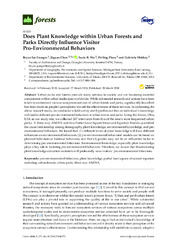Does plant knowledge within urban forests and parks directly influence visitor pro-environmental behaviors
| dc.contributor.author | Güngör, Beyza Şat | |
| dc.contributor.author | Chen, J. | |
| dc.contributor.author | Wu, S. R. | |
| dc.contributor.author | Zhou, P. | |
| dc.contributor.author | Shirkey, G. | |
| dc.date.accessioned | 2018-06-26T08:17:39Z | |
| dc.date.available | 2018-06-26T08:17:39Z | |
| dc.date.issued | 2018-03-28 | |
| dc.identifier.issn | 1999-4907 | en_US |
| dc.identifier.uri | http://hdl.handle.net/10679/5831 | |
| dc.identifier.uri | http://www.mdpi.com/1999-4907/9/4/171/htm | |
| dc.description.abstract | Urban parks and forests provide many services to society and are becoming essential components within urban landscapes worldwide. While substantial research and actions have been taken to understand various ecosystem services of urban forests and parks, significantly less effort has been made on people's perceptions toward the effectiveness of these services. In addressing the above research needs, we conducted a field survey and hypothesized that an individual's knowledge will lead to different pro-environmental behaviors in urban forests and parks. Using the Toledo, Ohio, USA as our study site, we collected 267 interviews from five of the area's most frequented urban parks. A three-way ANOVA and two Partial Least Square Structural Equation Models quantified the causal relationship among demography, plant knowledge, environmental knowledge, and pro-environmental behaviors. We found that: (1) different levels of plant knowledge will have different influences on environmental behaviors; (2) pro-environmental behavioral models can be based on planned behaviors or habitual behaviors; and that (3) gender may not be an influential factor in determining pro-environmental behaviors. Environmental knowledge, especially plant knowledge, plays a key role in fostering pro-environmental behaviors. Therefore, we reason that disseminating plant knowledge education materials will profoundly raise visitors' pro-environmental behaviors. | en_US |
| dc.description.sponsorship | University of Toledo ; Sustainable Energy Pathways (CHE) of the US National Science Foundation (NSF) | |
| dc.language.iso | eng | en_US |
| dc.publisher | MDPI | en_US |
| dc.relation.ispartof | Forests | |
| dc.rights | openAccess | |
| dc.title | Does plant knowledge within urban forests and parks directly influence visitor pro-environmental behaviors | en_US |
| dc.type | Article | en_US |
| dc.description.version | Publisher versiyon | |
| dc.peerreviewed | yes | en_US |
| dc.publicationstatus | Published | en_US |
| dc.contributor.department | Özyeğin University | |
| dc.contributor.authorID | (ORCID 0000-0003-2579-8349 & YÖK ID 29395) Güngör, Beyza | |
| dc.contributor.ozuauthor | Güngör, Beyza Şat | |
| dc.identifier.volume | 9 | en_US |
| dc.identifier.issue | 4 | en_US |
| dc.identifier.startpage | 1 | en_US |
| dc.identifier.endpage | 23 | en_US |
| dc.identifier.wos | WOS:000434856800015 | |
| dc.identifier.doi | 10.3390/f9040171 | en_US |
| dc.subject.keywords | Pro-environmental behaviors | en_US |
| dc.subject.keywords | Plant knowledge | en_US |
| dc.subject.keywords | Partial least square structural equation modeling | en_US |
| dc.subject.keywords | Urban forests | en_US |
| dc.subject.keywords | Urban parks | en_US |
| dc.subject.keywords | Three-way ANOVA | en_US |
| dc.identifier.scopus | SCOPUS:2-s2.0-85044835998 | |
| dc.contributor.authorFemale | 1 | |
| dc.relation.publicationcategory | Article - International Refereed Journal - Institutional Academic Staff |
Files in this item
This item appears in the following Collection(s)
Share this page



